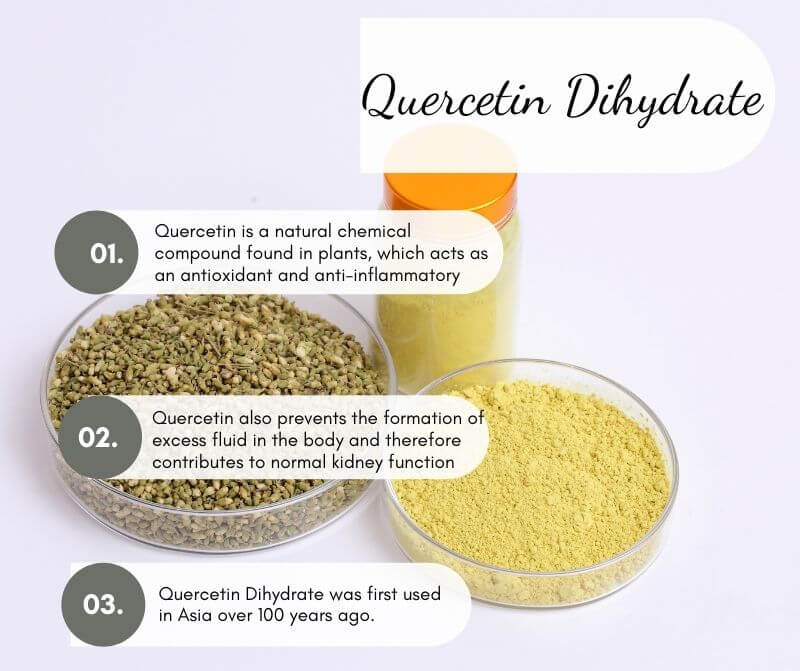What Are the Benefits of Quercetin Dihydrate
What Are the Benefits of Quercetin Dihydrate?
Quercetin is a natural chemical compound found in plants, which acts as an antioxidant and anti-inflammatory. It prevents the oxidation of LDL cholesterol and thus reduces the risk of heart disease, cancer, diabetes, and blindness. Quercetin also contributes to the healthy functioning of all organs by protecting them against free radical damage.
The pharmacological and nutraceutical uses of the compound are numerous. It has been used to treat diabetes and reduce blood pressure, bronchial asthma, and allergies. The ability of Quercetin to regulate blood sugar levels in people with diabetes is particularly noteworthy. Quercetin also prevents the formation of excess fluid in the body and therefore contributes to normal kidney function. Here are the significant benefits of Quercetin Dihydrate that you can grab from it.
1. Anti-Inflammatory
Quercetin Dihydrate is an antioxidant that prevents the oxidation of LDL cholesterol, thereby reducing the risk of heart disease, cancer, and inflammation. In addition to this, it has a regulatory role in the cell membrane by preventing cross-linkage between the cell membrane and lysosomes, thereby preventing cell death. Quercetin also reduces lipid peroxidation and thus offers significant protection against aging and Alzheimer's disease.
2. Anti-Cancerous Properties
Quercetin is being researched to prevent cancer and other diseases related to the growth of new blood cells, such as psoriasis. In addition, there is some scientific evidence that Quercetin may be effective against breast and prostate cancer, especially with other antioxidant nutrients like vitamin C or E.
3. Reduces Cholesterol Levels
The ability of Quercetin Dihydrate to lower cholesterol levels makes it an ideal choice for those who want to prevent heart disease. Often, the high cholesterol levels in the blood directly lead to atherosclerosis. Quercetin is also a potent antioxidant, which helps block free radicals and prevent the damage they cause.
4. Protects the Heart
The ability of Quercetin Dihydrate to prevent plaque deposits in the heart and arteries, thereby preventing the occurrence of heart attacks, makes it a valuable compound. It also stimulates the release of nitric oxide, which relaxes and widens blood vessels while decreasing platelet clumping and clotting. All these factors contribute to improved heart health.
5. Improves Brain Function
Quercetin protects brain cells from the psychoactive effects of excitotoxins such as neurotransmitter fog, which is related to the development of Alzheimer's disease. Quercetin also protects against oxidative stress and degenerative diseases that affect the functioning of nerve cells in the nervous system.
6. Prevents Cancer
Quercetin can stop cell change and cell division; therefore, it is considered a potent cancer fighter. It prevents the proliferation of blood cells in cancer patients and the production of tissue that lines the stomach and intestines. In addition to this, Quercetin inhibits carcinogen-induced cellular transformation.
7. Regulates Blood Glucose Levels
Quercetin Dihydrate is recognized for its beneficial effects on diabetes and insulin resistance. The ability of Quercetin to regulate blood sugar levels makes it a valuable compound. In addition, it prevents damage to insulin-producing cells, thereby eliminating the risk of type 2 diabetes. Insulin resistance is a condition where the kidneys and other organs in the body do not respond to the typical level of insulin, which is a hormone secreted by the pancreas.
8. Can Prevent Blindness
Quercetin Dihydrate has been used for years as an effective treatment for glaucoma, whose causes are linked to cataracts in the eyes. Abnormal cell death causes glaucoma and can lead to blindness if left unresolved. Quercetin Dihydrate protects normal cell metabolism and decreases the amount of fluid in the eye.
9. Reduces Asthma
Quercetin is a potent anti-inflammatory agent that helps relieve asthma by reducing excessive mucous production in the lungs with its anti-inflammatory properties. In addition, it reduces bronchial constriction and thus contributes to the alleviation of asthma symptoms.
10. Reduces Swelling
Quercetin Dihydrate is a potent anti-inflammatory compound that relieves swelling by reducing the production of inflammatory molecules in the cells. It also inhibits the formation of platelet clumping, which reduces the risk of heart attacks and strokes. It helps to reduce inflammation and thus protects against heart disease and stroke.
Quercetin Dihydrate was first used in Asia over 100 years ago. Its ability to prevent the degeneration of cell membranes and reduce blood cholesterol levels makes it an effective antioxidant that is also very beneficial in many other medical disorders involving inflammation.



 Healthier Future
Healthier Future